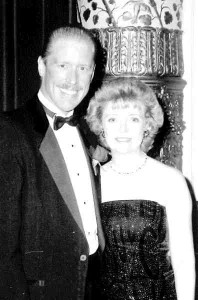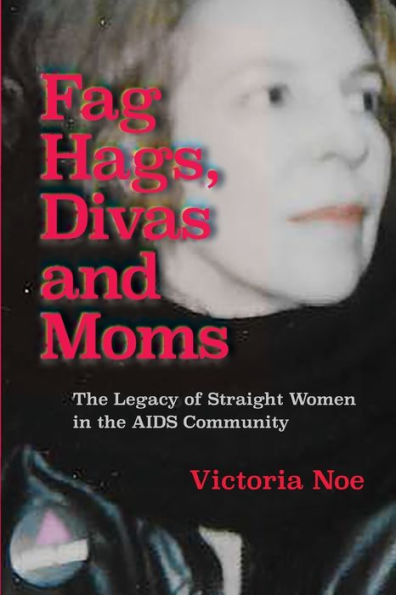"Forming Community" - AIDS@30
Nov 30, 2011 by Victoria Noe, in AIDS
, Disenfranchised grief
, Friend Grief
, Grief
, World AIDS Day
"Forming Community" first appeared in April in Windy City Times. I was honored that publisher Tracy Baim asked me to be part of her series on the history of the epidemic. For tomorrow, World AIDS Day, here it is:
 |
| Steve & I at the Drake |
"Forming Community" first appeared in April in Windy City Times. I was honored that publisher Tracy Baim asked me to be part of her series on the history of the epidemic. For tomorrow, World AIDS Day, here it is:
The first time I remember being conscious of the effects of AIDS was March, 1983. My girlfriend was in the hospital, after a difficult labor and delivery that called for a transfusion. She worked in the lab at that hospital and knew the blood supply wasn’t safe. When I visited her there, her sheets had more color. But she still refused the transfusion.
Sex in the 80’s – gay or straight – was a challenge. I was tested twice (once a requirement by a prospective lover, once to ease my own mind). I demanded the men I slept with wore condoms, and it was not always well received. There was much grumbling and insisting they were ‘all right’. But that was a deal-breaker, and no one talked me out of it.
I was volunteering occasionally, mostly to help raise money until 1989, when I took a job at Chicago House as development director. I was the only straight person in the office, something that did not meet with great approval.
The animosity I faced as a straight woman in the AIDS community surprised me. AIDS was still considered a gay issue, and there was a bit of territorialism. I suppose I was naïve. I had no agenda; I just wanted to help.
I came from a theatre background, so I’d had gay friends since high school (even wound up dating a couple, unintentionally). However, I’ve never been to a college reunion because so many of the guys I went to school with have died, many of them from AIDS. I found out one of them had died when I saw his panel on the cover of a book about the Names Project quilt.
I got a phone call from my mother one day, also in the 80’s. She had that “someone died” tone in her voice. When I asked her what was wrong, she said she called to tell me that Richard was gay. “And…?” I asked, fearing the worst. “That’s it,” she insisted. I couldn’t believe she didn’t know. Richard was my father’s best friend then, and remained so until the day my Dad died. Their friendship didn’t change because Richard came out; if anything they grew closer.
The work at Chicago House was challenging and exhilarating and sometimes frustrating. The mission statement read: “Chicago House provides residential and support services for people living with HIV & AIDS.” The problem, as it turned out, was the word ‘people’. Everyone assumed we only served men.
So I did something that was, well, wrong. I didn’t ask permission, and I certainly had no right to do it, but I changed that word in the mission statement. I changed ‘people’ to ‘men and women’. It was as if a light bulb went on, the reaction I got now was so different. “You have women living there?” And just like that, funding organizations looked at Chicago House differently.
While I was there, we opened the third house, which was a hospice. I remember it was a very cold Chicago winter day, with wind chills well below zero. Mayor Daley was coming to see the house, along with some media to record the visit. Now, relations were quite strained between the Mayor and the gay community at that time. In fact, he was coming to the house in Edgewater from a meeting with gay leaders at Ann Sather’s.
As usual, he was running late, but when he got there the schedule was forgotten. He went upstairs, with Tom Dombkowski and John Chester (the executive director and board chair), but without the media. I stayed on the first floor, but after a few minutes, he appeared at the top of the stairs and told the media to grab their cameras. “Come up here; you need to see this.” When the tour was finished, he sat in the living room and answered questions for some time.
There was a constant stream of fundraisers: bar events at Little Jim’s and Roscoe’s, drag shows, a dunk tank at Halsted Street Days, and our first black-tie event at the Drake. I was in London the year before on the first World AIDS Day, and a collection was taken up at curtain call in the West End theatres. I stole that idea the following year, and we sent volunteers to theatres to collect money for Chicago House. Some of my most dedicated volunteers have remained friends to this day.
I left Chicago House after a year (I’ll leave it at that), and continued to raise money in the AIDS community as a consultant with groups like Bonaventure House and Stop AIDS. But there was a price to pay, and it was an emotional one.
A year or so after I went out on my own, I went through as stretch of 11 weeks in a row, where someone I knew died every week. Only one was really close, Steve Showalter, who’d been my assistant at Chicago House. But all were men I’d known around the community, had worked with on projects, or just knew socially.
When I heard about the 11th one, I called my former acting teacher in L.A. and asked if I could visit. I booked a seat on Amtrak: two days with no phones, and no contact with others unless I wanted it. By the time I got there, I was able to hold a coherent conversation; by the time I came back a week later, I could work again.
I bought a copy of And the Band Played On, Randy Shilts’ indictment of pretty much everyone in the 80’s. I remember very clearly throwing the book across my living room several times. I’d read about government inaction, or medical fraud, or politics, and I’d have to stop to…throw the book. I considered at one point buying a copy that wasn’t so beat up, but I think I want to hold on to that reminder of my anger. My best friend asked recently why I read it when I’d already lived through it. The anger: that’s why.
Now and then, I’d mention going to a memorial service, visiting someone at Illinois Masonic, referring someone to Herdegen-Brieske (a funeral home that would take AIDS victims), and I would be asked “how did they get it?” There were few things – then or since – that could instantly infuriate me like that question. My responses were not exactly polite. The nicest I could come up with was “what the hell difference does it make?”
Looking back on that time, I was angry a lot. I felt as if I were living in London during the Blitz: never knowing where the bombs would drop, only that someone I knew would die. And most people didn’t care.
In 1993, I married a man who welcomed my gay friends. He had to: it was non-negotiable. Our wedding flowers all had red ribbons, and our reception was in the Gold Coast Room, the location of the first Chicago House black-tie dinner. One of my former volunteers, Russ Glidden, designed my invitation; another, Fred Eberle, sang at the wedding. We remembered those lost to AIDS during the ceremony.
My late father wanted our first dance to be “Wind Beneath My Wings”, but for possibly the only time in my life, I refused to do something he asked. I couldn’t do it, I told him, because virtually every memorial service I’d ever been to – and there were many – used that song. It was just too sad for me. So we danced to “Sunrise Sunset”. “Wind Beneath My Wings” was the only song played at his funeral.
There are those who feel an ownership to the AIDS crisis, and I understand that. There was certainly a lot of suspicion and occasional antagonism towards any “breeders” who joined the efforts. The gay community was devastated, and my losses pale in comparison.
When asked what I’m most proud of in my life, the little bit I was able to do for the 10 or 12 years I was involved in fundraising for AIDS organizations is close to the top of my list (sorry, my daughter’s at the top).
I wonder if what I did made any difference. Thirty years later I worry about my gay nephew, even though he assures me he practices safe sex. I worry about my gay friends, even the ones who I know are HIV-negative, because I’m used to worrying about them.
I remember a moment in the early 80’s. I don’t know where I was, or what I was doing, I just remember the moment. I thought to myself: “I don’t want to look back and be ashamed I stood by and did nothing.”
What I did wasn’t much, and it may not have changed anything. But I’d do it again, gladly, even knowing I’d lose so many people I cared about.

